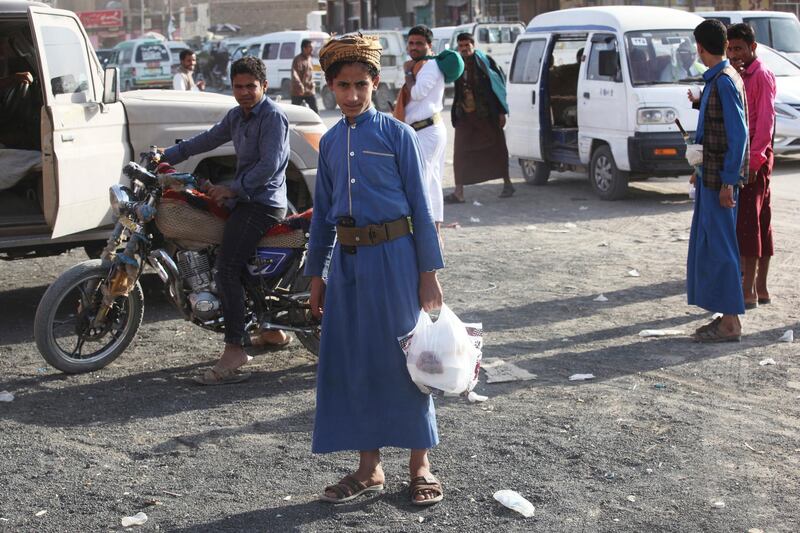The clang and thump of jackhammers and excavators fills the streets of Marib, an oil-rich Yemeni boomtown once accustomed to the sounds of conflict, now an oasis of stability in a country embroiled in a civil war.
Yemen is convulsed by the world's worst humanitarian crisis, with rampant disease, famine and a ruinous war pitting supporters of president Abdrabu Mansur Hadi against Iran-aligned Houthi rebels.
But the fall of Yemen has coincided with the rise of Marib, once seen as an Al Qaeda bastion, which has been spared much of the misery owing to its oil and gas reserves, proximity to Saudi Arabia and rare tribal cohesion that has helped repel Houthi incursions.
"We have managed to push the war far away from Marib," said provincial governor Sultan Al Arada. "Marib is untouchable."
________________
Read more:
Arab coalition launches offensive to drive out Al Qaeda in Yemen
Haley demands UN action over Iranian links to Yemen
Iran must pay for regional meddling, Saudi minister says
_______________
The border city is now Yemen's most thriving industrial hub, thanks in part to an influx of hundreds of thousands of internally displaced people, among them entrepreneurs, doctors and Yemen's elite that is driving up investments and real estate prices.
Hundreds of new businesses have come up, ranging from eateries to water bottling plants.
Jobs in Marib offer salaries, a novelty to legions of employed youths in a country with chronic joblessness.
"The spectacular rise of Marib has come not despite the conflict, but because of it," Farea Al Muslimi, a Yemen expert at Chatham House think tank based in London.
"Marib has gained from the chaos surrounding it."
Its university is expanding and businessmen who once fled the war are slowly returning.
That includes Obaid Zubaiyen, head of a family-run trade and construction enterprise with interests across the Arabian Gulf, who fled Yemen in 2011 amid increasing turmoil.
"The family is back because Marib means opportunity," said Misbah Ohag, a group manager, showing a blueprint of a planned multimillion dollar project of villas, apartments and malls.
Governor Arada plans an international airport and aims to make Marib, home to temple ruins from the ancient Sabaean kingdom, a magnet for tourists.
But some scars of the war rumbling on outside Marib are still visible inside the province.
At a rehabilitation centre for child soldiers, drawings sketched by the youngsters are telling.
One showed a grenade, a tank, a helicopter gunship and crimson splashes of blood.
"They blew up my school," read the caption.
Houthi rebels have planted thousands of landmines around Marib and the mangled wreckage of cars litter its mountainous border.
"So many dead and limbless people," said Mohammed Abdo Al Qubati, head of Marib general hospital, home to Yemen's only functional prosthetic limbs centre in government territory.
"It's like we are waiting for the remaining people to die."
Marib, with an original population of about 350,000, is reeling under the weight of what officials say are 1.5 million displaced people from across Yemen, putting a strain on resources.
In a decrepit camp on its outskirts, dozens of people from a tribe called Jaham tugged at the sleeves of Saudi aid officials, imploring them for more relief supplies.
"This is the kind of life you wish upon your enemy. We used to live in palaces, now we live in tents," said a tribesman from nearby Sirwah district, which was overrun by the Houthis.
"No, no," interjected another tribesman. "This is not even a tent; this is wood covered with a flimsy blanket."
Houthi rebels besieged Marib for months in 2015 after they captured the capital Sanaa but they were pushed back in fierce clashes with local tribesmen aided by the Saudi-led coalition of which the UAE is a member.
Arada, one of the region's most influential tribal leaders, rallied fellow elders to pledge loyalty to the Hadi government — even those who traditionally supported the Houthis.
The US, behind regular drone strikes in the territory to combat Al Qaeda, has imposed sanctions on Mr Arada's brother, accusing him of supporting the group, a charge the governor vehemently denies.
Marib faces the constant threat of Houthi rockets, hundreds of which have been launched towards the city.
A missile strike killed six children last year during Eid festivities, Mr Arada said.
Paying a heavy price for the conflict are thousands of divided families in Yemen, split between Houthi and government territory.
"We go through checkpoint, checkpoint, checkpoint," said Amina Al Ayashi, 55, describing a circuitous route to Sanaa, where her journalist son Taufiq is in a Houthi jail as the rebels crack down on the media.
"It feels like a whole lifetime. They humiliatingly search us. We bring clothes, bread, vegetables. They refuse," she trailed off.
Morsal Haidara, an English professor at Marib University, which restarted in 2016 after being shut down during months of fighting, draws parallels with Shakespeare's Hamlet, comparing the rebels to the character King Claudius who seized the throne by poisoning his own brother.
"What's happening in Yemen is a tragedy," he said.





